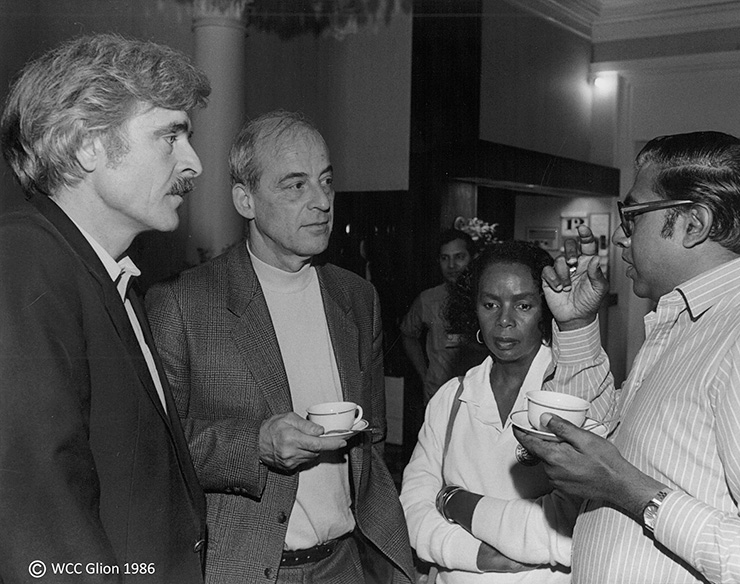
Lukas Vischer (1926–2008)
Ecumenist, pioneer of the church environmental movement, human rights advocate

“The ecumenical movement is not only about moving past the differences that arose in the past but also about finding new expression and form for the universal communion in Christ.”
Lukas Vischer grew up in Basel as the youngest son of a patrician family. He played chess with Karl Barth’s sons and took confirmation classes with the well-known Protestant theologian Eduard Thurneysen. With interests in law, history, and Latin, he would turn to theology in 1946 in search of meaning. The World Student Christian Federation met in Basel during Pentecost in 1946: When a German man and a French woman, whose father had been executed as a hostage in the war, were able to celebrate communion together at the end of the meeting, this act of intercommunion and reconciliation across borders served as a formative experience for the new student.
After studying in Basel, Strasbourg, Göttingen, and Oxford, and serving as a pastor in Herblingen-Schaffhausen, Vischer was appointed to be research secretary at the World Council of Churches in Geneva in 1960. There he served as director of the Faith and Order Commission (1966–1979). It had the task of providing churches with the ways and means of overcoming their deep-seated divisions and achieving new unity. As its director, Vischer also maintained close ties with the Orthodox Churches of the Eastern Bloc.
He followed the deliberations of the Second Vatican Council as an observer on behalf of the World Council of Churches from 1962 to 1965. Vischer remained secretary of the Joint Working Group between the WCC and the Vatican through 1979. And he was also active in interreligious affairs, organizing, for example, the WCC’s first Christian-Muslim dialogue in Cartigny near Geneva in 1968.
Ecumenism was the central theme of Vischer’s life. In 1975, speaking at the WCC Assembly in Nairobi, he said: “It is certainly one of the tasks of the present generation to reshape the universal communion of the church.” His many travels enabled him to make contacts around the world and gain insights into the often difficult living situations of Christians and churches. He was always driven by the question: In view of the challenges of the day, what form should the common witness of the church take? Vischer became a co-initiator of the 1973 Leuenberg Agreement, which paved the way for pulpit and table fellowship among a variety of different Protestant churches. For the ecumenist Vischer, pursuing theology also meant listening to the answers of others and learning from them, translating different points of view into resolutions and then establishing them in church practice. In so doing, he inspired the acceptance of the Leuenberg Agreement in many Reformation churches. The 1982 WCC document on Baptism, Eucharist, and Ministry (Lima Document), for example, developed under his auspices.
Following his time with the WCC, Vischer taught ecumenical theology in Bern and headed the Protestant Office for Ecumenism in Switzerland, located at the headquarters of what was then the Federation of Swiss Protestant Churches (now Protestant Church in Switzerland, PCS). Affiliated with the FSPC and yet independent, the department dealt with issues that still remain relevant to the FSPC in the process of finding inner-Protestant and ecumenical unity. Volumes published by Vischer included titles such as Wachsende Kirchengemeinschaft (“Growing Church Community”), Reformiertes Zeugnis heute (“Reformed Witness Today”), Was bekennen die evangelischen Kirchen in der Schweiz? (“What do the Protestant churches in Switzerland believe?”), and Christliches Zeugnis in einer pluralistischen Gesellschaft (“Christian Witness in a Pluralistic Society”). Vischer founded the FSPC Orthodoxy Commission and initiated the FSPC’s relations with the Orthodox churches of Russia and Georgia, the China Christian Council, and Reformed Churches in South Korea. In addition to his ecumenical work, he was committed to clarifying and strengthening the Reformed identity, with the deep conviction that ecumenism should not eliminate one’s own denominational identity.
In 1981, Vischer and his wife, the lawyer Barbara Schmidt, founded the Swiss section of the International Federation of Action by Christians for the Abolition of Torture (ACAT). In 1986 he co-founded the ecumenical working group on Churches for the Environment (OeKU) and the Bern Declaration (today Public Eye). The WCC has now been addressing climate change for three decades thanks to his commitment to the protection of creation through the Conciliar Process on Justice, Peace and Integrity of Creation, which followed the Vancouver Assembly in 1983 and culminated in the Seoul World Convocation in 1990. Vischer found that the churches paid too little attention to the integrity of creation and the victims of climate change. He consequently focused his own efforts on the theology of creation and the ecological responsibility of the churches and participated in bringing about the WCC program on climate change.
Vischer also warned of the consequences of climate change within the World Alliance of Reformed Churches. He served as chairman of the Theological Department of the World Alliance of Reformed Churches from 1982 to 1989 and moderator of the Program Committee at Geneva’s John Knox Center from 1982 to 2008. It was there in 2007 that Vischer initiated the “Témoigner Ensemble à Genève” (“Witnessing Together in Geneva”) movement, which connects over 60 migrant communities with the city’s Reformed congregations. His work on Calvin was published posthumously, in which Vischer analyzed the Geneva reformer’s thoughts on church unity, social justice, responsibility for God’s creation, and the sanctity of life in times of armed conflict.
Vischer served as a mediator between church life and scientific research, and between the local and universal church. “Vischer’s commitment to the ecumenical movement had a Protestant core anchored in the Gospel of Jesus Christ. For him there is no discipleship that does not have to hold up to the forum of the oikoumene, the inhabited earth.” Geiko Müller-Fahrenholz.


